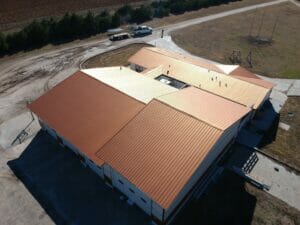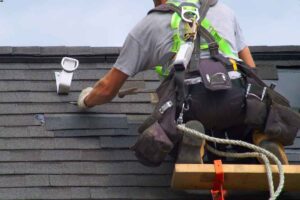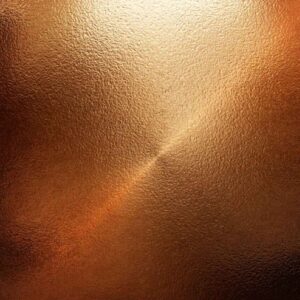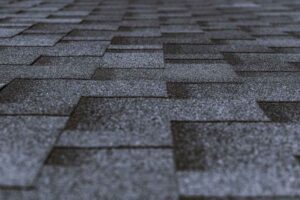Updating your existing Great Bend roof allows you to add value to your home and communicate your home’s look and feel. While roof framing, preparation, and proper installation are always important, the material you choose for your roof can bring the exterior of your home to the next level. There are lots of options for roofing materials available and here is a rundown of some of the most popular ones.
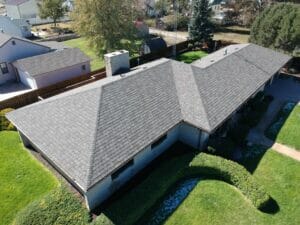
Asphalt Shingles
Almost 90% of homes in the US use composite asphalt shingles because they’re affordable, durable, and easy to install. Asphalt shingles can last up to 30 years and can be recycled to make pavement. Manufacturers mix fiberglass, asphalt, and mineral composite to create a variety of colors like gray, brown, red, green, or blue. However, their color will fade over time due to sun exposure. The color and quality will look different depending on whether you choose architectural or three-tab shingles.
Pros
- Affordable
- Low-maintenance
- Easy to find
- Works well in most climates
- Comes in a variety of colors
- Recyclable
Cons
- Color fades with sun exposure
- 3-tab style prone to wind damage
- Short lifespan
Clay Tiles
Clay tiles are one of the most popular roofing materials in the world and date back 5,000 years to glazed earthenware rooftops in China. They last anywhere from 50 to 100 years or more, and you can choose from a variety of styles like Spanish, French, Scania, and more. While expensive to install and repair, clay tiles last longer than almost all other types of roofing. It’s common in places like Southern California and Florida because clay roofing is perfect for hot climates, can endure winds of up to 150 miles per hour, and is incredibly fire-resistant.
Pros
- Low-maintenance
- Great curb appeal
- Colors include terracotta, red, brown, and gray
- Made from natural materials
- Regulates temperature inside the home
Cons
- Vulnerable to impact
- May need extra structural support for its weight
- May require specialized labor to install and repair
Slate Roofing
Slate is one of the most durable types of roofing material and is similar in cost to clay tiles. This material can last 50 to 200 years. In addition to being fireproof and resistant to high winds and extreme temperatures, it is also resistant to impact from hail and small branches. You can choose from natural, quarried slate, or synthetic alternatives like fiber cement slate or bituminous styles. Synthetic slate is much more affordable and has many of the same benefits as natural.
Pros
- Long lifespan
- Low-maintenance
- Durable
- Colors include gray, blue, green, brown, and red
Cons
- Cost
- May need extra structural support for its weight
Metal Roofing
Metal roofing feels like a modern choice, but they’ve been around since the 1800s. Metal sheets and shingles continue to be popular choices today because materials like aluminum and zinc are affordable, easy to transport, low-maintenance, and beautiful—even with age. They can last up to 80 years depending on design and material. You can also have the metal pre-treated with sealants. While metal roofing can come in a variety of colors, you can also paint some styles.
Pros
- Low-maintenance
- Durable
- Can mimic slate, asphalt, or wood
- Variety of colors
- Lightweight
- Recyclable
Cons
- Needs soundproofing to reduce noise
- May warp or develop ripples with improper installation
- Requires specialized labor to install and repair
Solar Shingles
Solar shingles are one of the newest types of roofing materials. You’ll need to hire a roofer who specializes in building-integrated photovoltaics (BIPV) to install it.
While solar shingles may work efficiently for 20 to 30 years, this renewable energy solution is an expensive investment. Despite steeper installation costs, they can boost the value of your home by $15,000 or more. The future of US solar power looks bright.
Pros
- Produces usable, renewable energy for your home
- Improves resale value
Cons
- Requires specialized labor to install and repair
- Moderate maintenance
- Needs extra structural support for weight and wiring
Conclusion
Roof replacement can be expensive, but it’s imperative that it’s done correctly or you could face major problems down the road. There are plenty of roofing types available to fit your budget and needs. Choosing the right kind and hiring a professional installer will provide you with peace of mind that your home is protected for years to come. So for your Great Bend roof, contact Shull Roofing trusted Roofing Specialist today for a free estimate!

